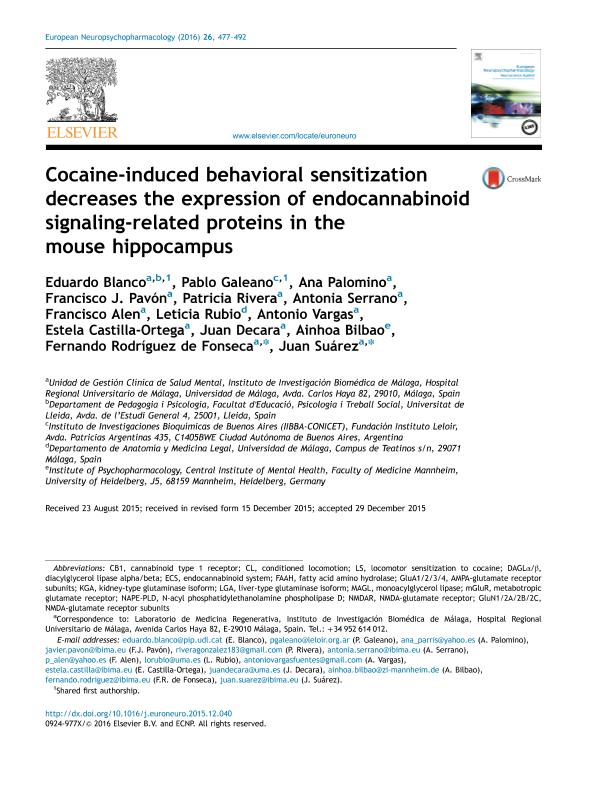Artículo
Cocaine-induced behavioral sensitization decreases the expression of endocannabinoid signaling-related proteins in the mouse hippocampus
Blanco, Eduardo; Galeano, Pablo ; Palomino, Ana; Pavon, Francisco J.; Rivera, Patricia; Serrano, Antonia; Alen, Francisco; Rubio, Leticia; Vargas, Antonio; Castilla-Ortega, Estela; Decara, Juan; Bilbao, Ainhoa; Rodríguez de Fonseca, Fernando; Suaréz, Juan
; Palomino, Ana; Pavon, Francisco J.; Rivera, Patricia; Serrano, Antonia; Alen, Francisco; Rubio, Leticia; Vargas, Antonio; Castilla-Ortega, Estela; Decara, Juan; Bilbao, Ainhoa; Rodríguez de Fonseca, Fernando; Suaréz, Juan
 ; Palomino, Ana; Pavon, Francisco J.; Rivera, Patricia; Serrano, Antonia; Alen, Francisco; Rubio, Leticia; Vargas, Antonio; Castilla-Ortega, Estela; Decara, Juan; Bilbao, Ainhoa; Rodríguez de Fonseca, Fernando; Suaréz, Juan
; Palomino, Ana; Pavon, Francisco J.; Rivera, Patricia; Serrano, Antonia; Alen, Francisco; Rubio, Leticia; Vargas, Antonio; Castilla-Ortega, Estela; Decara, Juan; Bilbao, Ainhoa; Rodríguez de Fonseca, Fernando; Suaréz, Juan
Fecha de publicación:
03/2016
Editorial:
Elsevier Inc
Revista:
European Neuropsychofarmacology
ISSN:
0924-977X
e-ISSN:
1873-7862
Idioma:
Inglés
Tipo de recurso:
Artículo publicado
Clasificación temática:
Resumen
In the reward mesocorticolimbic circuits, the glutamatergic and endocannabinoid systems are implicated in neurobiological mechanisms underlying cocaine addiction. However, the involvement of both systems in the hippocampus, a critical region to process relational information relevant for encoding drug-associated memories, in cocaine-related behaviors remains unknown. In the present work, we studied whether the hippocampal gene/protein expression of relevant glutamate signaling components, including glutamate-synthesizing enzymes and metabotropic and ionotropic receptors, and the hippocampal gene/protein expression of cannabinoid type 1 (CB1) receptor and endocannabinoid metabolic enzymes were altered following acute and/or repeated cocaine administration resulting in conditioned locomotion and locomotor sensitization. Results showed that acute cocaine administration induced an overall down-regulation of glutamate-related gene expression and, specifically, a low phosphorylation level of GluA1. In contrast, locomotor sensitization to cocaine produced an up-regulation of several glutamate receptor-related genes and, specifically, an increased protein expression of the GluN1 receptor subunit. Regarding the endocannabinoid system, acute and repeated cocaine administration were associated with an increased gene/protein expression of CB1 receptors and a decreased gene/protein expression of the endocannabinoid-synthesis enzymes N-acyl phosphatidylethanolamine D (NAPE-PLD) and diacylglycerol lipase alpha (DAGLα). These changes resulted in an overall decrease in endocannabinoid synthesis/degradation ratios, especially NAPE-PLD/fatty acid amide hydrolase and DAGLα/monoacylglycerol lipase, suggesting a reduced endocannabinoid production associated with a compensatory up-regulation of CB1 receptor. Overall, these findings suggest that repeated cocaine administration resulting in locomotor sensitization induces a down-regulation of the endocannabinoid signaling that could contribute to the specifically increased GluN1 expression observed in the hippocampus of cocaine-sensitized mice.
Archivos asociados
Licencia
Identificadores
Colecciones
Articulos(IIBBA)
Articulos de INST.DE INVEST.BIOQUIMICAS DE BS.AS(I)
Articulos de INST.DE INVEST.BIOQUIMICAS DE BS.AS(I)
Citación
Blanco, Eduardo; Galeano, Pablo; Palomino, Ana; Pavon, Francisco J.; Rivera, Patricia; et al.; Cocaine-induced behavioral sensitization decreases the expression of endocannabinoid signaling-related proteins in the mouse hippocampus; Elsevier Inc; European Neuropsychofarmacology; 26; 3; 3-2016; 477-492
Compartir
Altmétricas



